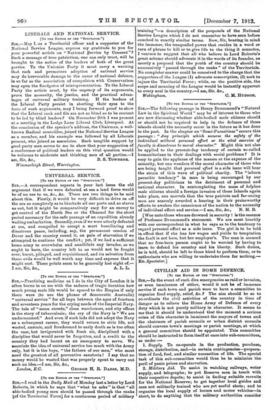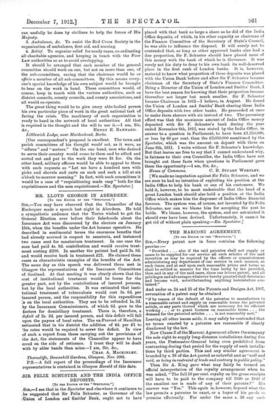CIVILIAN AID IN HOME DEFENCE.
[To THE EDITOR OF THE "SPECTATOR."]
Siu,—In the event of such dire emergencies as raid or invasion, or even imminence of either, would it not be of immense service if each town and parish were to have a committee to organize food supply, relief, Ate.? The aim should be so to co-ordinate the civil activities of the country in time of danger as to relieve the Home Army of Defence of every duty which is not purely military in character. It seems to me that it should be understood that the moment a serious crisis of this character is imminent the mayors of towns and the chairmen of parish councils or urban district councils should convene town's meetings or parish meetings, at which a general committee should be appointed. This committee should be instructed to form itself at once into sub-committees, as under :— 1. Supply. To co-operate in the production, purchase, storage, distribution, and—in certain contingencies—preparas tion of food, fuel, and similar necessities of life. The special task of this sub-committee would thus be to minimize the peril of panic prices and starvation.
2. Military Aid. To assist in watching railways, water supply, and telegraphs ; to put Reserve men in touch with their respective depots; to assist in finding suitable recruits for 'the National Reserve; to get together local guides and men not militarily trained who are yet useful shots; and to organize the local supply of horses and motor vehicles—in short, to do anything that the military authorities consider can usefully be done by civilians to help the forces of His Majesty.
3. Ambulance, &c. To assist the Red Cross Society in the organization of ambulance, first aid, and nursing.
4. Belief. To organize relief for needy cases, co-ordinating all charitable agencies, and keeping in touch with the Poor Law authorities so as to avoid overlapping.
It should be arranged that each member of the general committee should work on one, but not on more than one, of the sub-committees, saving that the chairman would be ex officio a member of all sub-committees. By this means every- one's special knowledge of his own subject would be brought to bear on the work in hand. These committees would, of course, keep in touch with the various authorities, such as district councils, county councils, and county associations, and all would co-operate.
The great thing would be to give every able-bodied person his own particular piece of work in the great national task of facing the crisis. The machinery of such organization is ready to hand in the network of local authorities. All that is required is the thought and the will to use it.—I am, Sir,
[Our correspondent's proposal is excellent. The town and parish committees of his thought would act, as it were, as " sifters " and "sorters." On the one hand, men who desired
• to serve their country would come to them and be sifted and sorted out and put to the work they were fit for. On the other hand, military officers would be able to appeal to them with such requests as "Let me have a hundred men with picks and shovels and carts on such and such a hill at six o'clock to-morrow morning." In fact, with such committees it would be a case of "requisitioning made easy" both for the requisitioners and the men requisitioned.—En. Spectator.]







































































 Previous page
Previous page